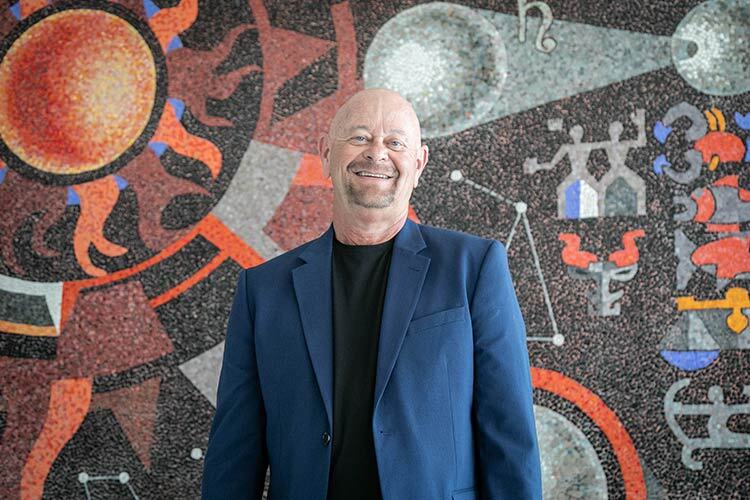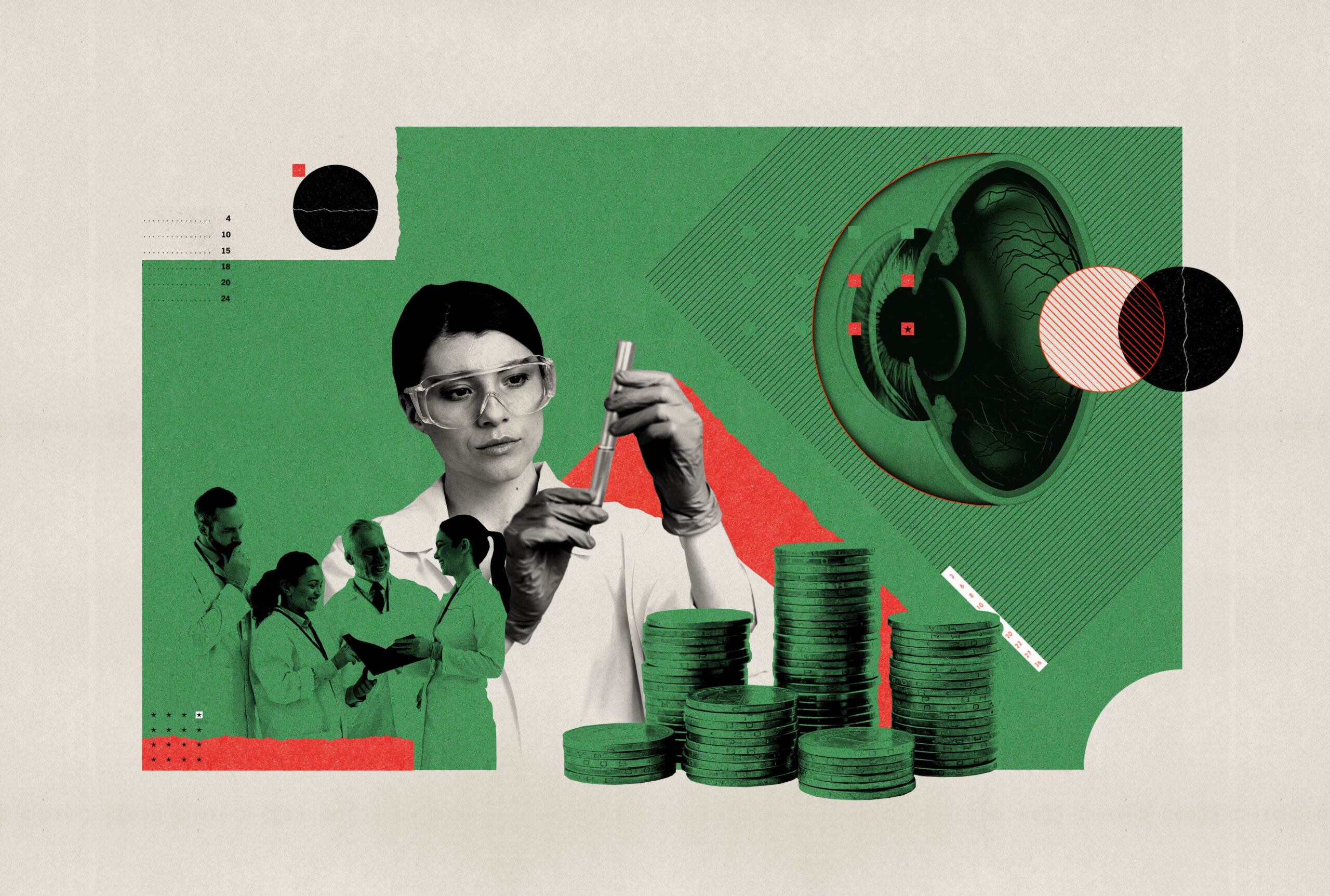Floyd Chilton sees his career as nothing short of a miracle. Growing up on a small tobacco farm in the Appalachian Mountains, he never imagined his career would unfold the way it has. Chilton, who now introduces himself as Ski, tells the story of how his parents scraped their money for a year to buy him a telescope. He would spend his days on his family’s farm looking up at Saturn, Jupiter and Mars. “Even from humble beginnings, there was this intense curiosity about nature,” he says sitting in Tec de Monterrey’s campus, where he is part of the Faculty of Excellence initiative.
Those humble beginnings weren’t Chilton’s only obstacle. He was also severely dyslexic and graduated high school without being able to read properly. He made it to college by playing sports, realizing halfway through his college years that he was skilled in the sciences, particularly biology and chemistry. After getting his six-year PhD in three years from Wake Forest University, he was recruited to Johns Hopkins University as a young assistant professor. Eventually he made his way to the University of Arizona where he now runs the Center for Precision Nutrition and Wellness.
First of all, can you explain what precision nutrition means for people who may not be familiar with the concept?
We’re in the middle of a scientific revolution and it started in cancer. It used to be we treated cancer with chemotherapy or we treated it with radiation, but they were really broad treatments and they were really quite ineffective at treating the most serious types of cancer. We then began to understand that even within a cancer like a lung cancer, there were 20 or 30 different types of cancer or causes of the cancer and then we began to create therapeutics, immunotherapies for the specific cancers. So it moved from a one size fits all to very individualized. That was the emergence of precision.
But precision has now dramatically increased. It’s increased in all parts of medicine. It’s increased to nutrition. It’s increased to wellness. But primarily, it’s the capacity to take immense amounts of data —genomic, metabolomic, clinical— and take many, many millions of inputs and feed it into machine learning algorithms or A.I. algorithms, and then be able to individualize health care for the individual. Because one size doesn’t fit all and in fact, in some cases, the one size that is therapeutic for one population is actually causing destruction for another population.
Most of this precision in humans is built on early evolution. What was happening 200,000 years ago in the savannas of Africa was dramatically different from what was happening 40,000 years ago out of African populations in Europe. That was dramatically different from 30,000 years ago in Asia, and 25,000 years ago, as you’re moving up Siberia across the Bering Strait and Beringin and 15,000 years ago in North and South America. Diets were different, pathogens were different, temperatures were different, everything was different. Evolution did its job in each case. But we carry that ancestral genetics into modern populations. And then we feed people with a modern Western diet and it devastates certain populations.
What are some concrete examples that you’ve seen of something that can be therapeutic for one population and harmful to another?
In 1961, the American Heart Association said saturated fatty acids are bad. Eat polyunsaturated fatty acids or PUFAs. The food industry was ready for that recommendation, so we instantly went to cooking oils that are the basis of processed foods, and those cooking oils contained PUFAs that were Omega-6 PUFAs, 95 percent of them. Now, many of us who had worked on Omega-6 PUFAs and its metabolism understood if those fatty acids and those cooking oils were metabolized to another fatty acid much higher in the pathway that that would cause dramatic inflammation. But at the time, the assumption was one size fits all and only two to three percent of that would be metabolized to these pro-inflammatory mediators. So we instantly went to eight to ten percent of our daily energy as Omega-6 PUFAs.
Nothing in the modern Western diet changed so rapidly and it was based on studies that reduced cholesterol in non-Hispanic white populations. Well, my lab discovered that there were genetic variants in a region of chromosome 11 that control that metabolism in everyone, but the variants were dramatically different in African and African ancestry populations than in European ancestry population. So the metabolism was dramatically different in African and African American populations and instead of two to three percent energy going to these pro-inflammatories, it was seven to eight percent energy. That was devastating.
We just published a paper three weeks ago in which we’ve shown that Omega-3s will reduce heart attacks in African Americans, but not whites reanalyzing 26,000 people in a clinical trial over five years. The reason it probably works is because of this metabolism that is making it pro-inflammatory in African Americans and that’s being balanced by the Omega-3s. So the same recommendation is probably devastating Mexican and Mexican American populations with cardiometabolic disease because as opposed to it being efficiently metabolized in African Americans, in 60 percent of Mexican populations, there’s almost no metabolism. What happens in that case is there’s both Omega-6s and Omega-3s going into the pathway but because the pathway is so small, our lab has discovered that the Mexican populations are not making Omega-3 fatty acids.
So huge opportunities to intervene. But we have to intervene based on the genetics and ancestry of the population. My lab just got a $4 million grant from the National Institutes of Health to put Omega-3s into African Americans and non-Hispanic whites. We’re stratifying them by race and by genotype and we can make very good predictions in which populations those Omega-3s will reduce cardiovascular disease.

So the idea then is that a person could walk into a clinic and be able to get a personalized nutritional plan that would be tailored exactly to their genetics and their ancestry?
We’re not there yet. There’s thousands and thousands of tests, most of them aren’t effective. Most of them do not provide information that is relevant. In fact, of the thousands and thousands of tests, we found 103 that have the scientific and the efficacy basis to say use this test. We’re in an awkward time right now. We now have tests. We have machine learning and A.I. and we have to put it all together. We’re probably three to five years away from being able to say these are the tests. This is the machine learning. This is the A.I. This is the individual and this is what this individual needs to do from a medical perspective, from a nutrition perspective, which type of exercises should they be doing. That’s the future but the precision revolution has started.
We’ve seen an industry take advantage of the hopes and fears of people, whether it be weight loss, whether it be anti-aging, whether it be exercise, we’ve seen society be taken advantage of by horrible science or a complete lack of science. But we’re now moving into an area where we can much, much better understand what’s going to be effective for humans, whether it be from a nutrition perspective, a supplement perspective, a wellness perspective or a medicine perspective.
Was there a moment in your career that inspired you to realize that this was important and this is the kind of work that you wanted to pursue?
My career has been a miracle. I’ve spent 20 years in Africa. I was in South Africa during the AIDS epidemic trying to help orphans. I was in Darfur when almost a million people were killed in Sudan. That has nothing to do with my science, has everything to do with my heart for people. Carl Jung, the father of psychology, used the term synchronicity. I’m very, very big on that although it’s not scientific, if we’re doing our best to love the world, we’re doing our best to help the world, the awards don’t matter. The awards will come. In my case, the 57-page resume will come and it will be meaningless to you. The only thing that will be meaningful is how did my work help people who were suffering and what did I do in my time here, in my short life to help people?
I strongly believe if you’re in that river, that that river will take you right where you’re supposed to be when you’re supposed to be there. That’s why I’m sitting here doing this interview at Tec de Monterrey. Who could imagine the little boy in a house without a bathroom in the Appalachian Mountains would be sitting here trying to really, really help with gene diet interactions and cardiometabolic disease at a beautiful place like Tec de Monterrey?
What are you most looking forward to in your time here?
When I first came here, the students were amazing. They were simply amazing. I love that you had such a high proportion of your students on scholarships. Because what that indicates to me is you’re going throughout, primarily Latin America and Mexico, and you’re finding the best and the brightest no matter where they are. That’s a heart and I hope to motivate those students to help them believe that they can do so much with their lives, that they can dramatically change and believe their life can be a miracle and can change the world. If they believe that strongly, if they’re that purpose driven, then they will change the world.
Secondarily but equally important, cardiometabolic disease here and in particular diabetes is horrific. It’s a very different disease than we see in non-Hispanic whites in the U.S. Diabetes appears very different here. We think with the same gene-diet interaction that is impacting African Americans in a different way for cardiovascular disease is impacting 60 percent of Mexicans in another way. But it’s the same area of the human genome. And it’s this modern Western or Mexican diet interacting with this part of the genome that’s creating this type of diabetes, this type of cardiometabolic disease that is so devastating to the population.
If we want to live long, happy, and joyful lives in which we don’t suffer as much and our loved ones don’t suffer as much, then we owe it to ourselves to, as best we can, to eat healthy diets and to exercise. In two to three years, we’re going to say you’ve got this genotype, you’ve got this haplotype and you need to do this. That’s coming. We’re not quite there yet but the precision revolution has started and the precision revolution is going to now move very, very quickly, given our ability to process large amounts of data.
Cancer is the success story. With the immunotherapies that we have, we’re able to cure stage four, devastating cancers that would have been unthinkable to cure 20 years ago. Cancer hasn’t gone as far as it can go but if the world needs a proof of principle of what this precision revolution can do, they need look no farther than immunotherapy in cancer.
Did you find this story interesting? Would you like to publish it? Contact our content editor to learn more at marianaleonm@tec.mx.















